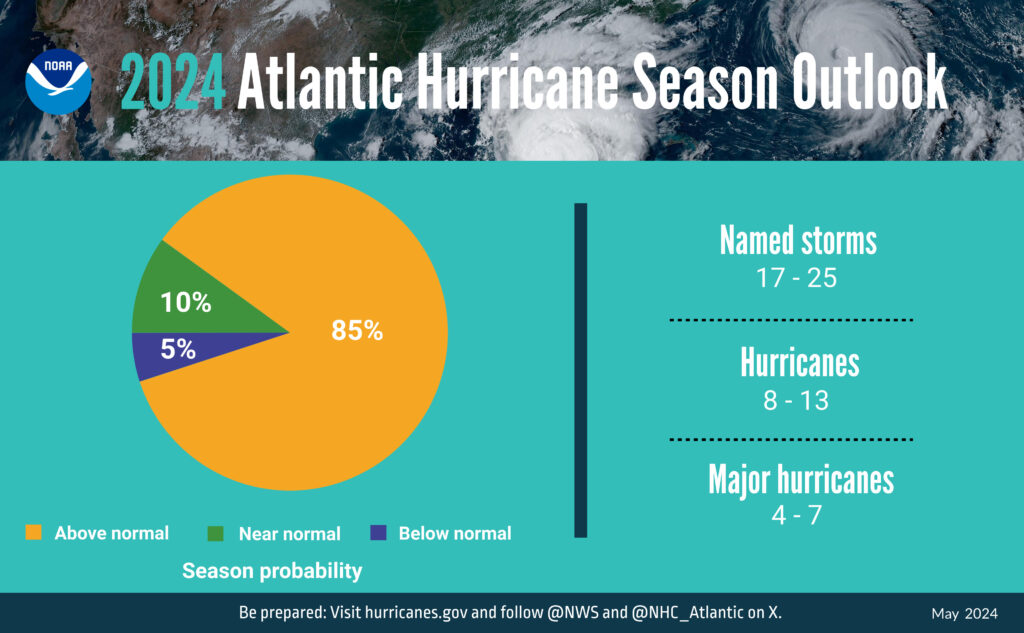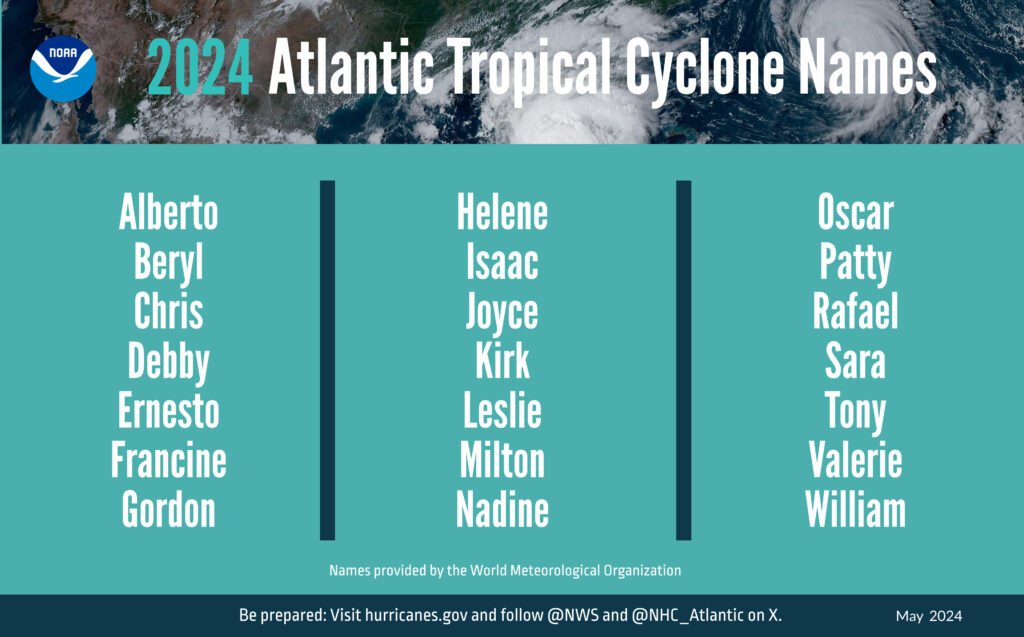
NOAA Predicts 2024 Hurricane Season Activity Will Be Above-Normal
Forecasters are predicting a range of 17 to 25 named storms, of which 8 to 13 could become hurricanes, including four to seven major hurricanes, designated as category three or higher on the Saffir-Simpson Hurricane Wind Scale.
The 2024 Atlantic hurricane season, which runs from June 1 through November 30, may be unfavorable according to forecasters at the National Oceanic and Atmospheric Administration (NOAA) Climate Prediction Center.
With 70% percent confidence, NOAA is predicting an 85 percent chance of an above-normal season, a 10 percent chance of a near-normal season and a five percent chance of a below-normal season. Forecasters are predicting a range of 17 to 25 named storms, of which 8 to 13 could become hurricanes, including four to seven major hurricanes, designated as category three or higher on the Saffir-Simpson Hurricane Wind Scale.
This hurricane season also features the potential for an above-normal West African monsoon, which can produce African easterly waves that create some of the strongest and longer-lived Atlantic storms.
The higher forecast is primarily due to near-record warm ocean temperatures in the Atlantic Ocean, development of La Nina conditions in the Pacific, reduced Atlantic trade winds and less wind shear.

Backing up the prediction from NOAA, researchers at Colorado State University (CSU) also predict the season will be extremely active. CSU researchers forecast that there will be about 23 named storms and 11 hurricanes this year; five of which will be major hurricanes.
The CSU team expects that hurricane activity in 2024 will be about 70 percent higher than the average season from 1991 to 2020. In comparison, hurricane activity in 2023 was about 20 percent higher than the average season.
The CSU researchers will be publishing updated forecasts on the 2024 Atlantic hurricane season on June 11, July 9 and August 6, 2024. You can check in on the updates by visiting the CSU Tropical Weather & Climate Research webpage.
2024 Atlantic Hurricane Season Names
Below are the names of tropical storms or hurricanes that may form in the Atlantic Ocean in 2024, provided by the World Meteorological Organization:
Alberto, Beryl, Chris, Debby, Ernesto, Francine, Gordon, Helene, Isaac, Joyce, Kerk, Leslie, Milton, Nadine, Oscar, Patty, Rafael, Sara, Tony, Valerie and William.

When hurricanes are deemed particularly destructive or significant, their names are retired from the list of usable storm names – Hurricane Dora and Hurricane Otis were removed from the list for 2023.
Resources to Prepare for Hurricanes
Research shows that hurricanes are getting stronger worldwide. Over the past 50 years, the average time it takes for hurricanes to dissipate when they hit land has doubled and there has been an increase in the frequency and intensity of the storms. With this year’s anticipated higher-than-average hurricane forecast, it is more important than ever to be prepared in case disaster strikes.
The International Code Council has resources and information available to help ensure communities stay informed on how to best prepare for disasters, like hurricanes, and what to do in the aftermath of the storm. The Code Council’s Hurricane Safety and Resources Toolkit provides resources on disaster safety and mitigation for code officials and the public to use. There you can access the Natural Disaster Preparedness Guide which provides tips on long-term preparation and what to do when facing the immediate threat of a disaster.
There are several disaster relief and safety organizations that are available to help when needed and provide up-to-date hurricane protection resources including FEMA, FLASH, the National Weather Service, and the American Red Cross.
Hurricane Preparedness Building Standards
One of the best ways for communities to mitigate and prepare for natural disasters, like hurricanes, is to build using the most up-to-date, modern building codes and standards.
Two building standards are currently available that are related to hurricane safety and preparedness: “ICC 500-2020 ICC/NSSA Standard for the Design and Construction of Storm Shelters” and “ICC 600-2020 Standard for Residential Construction in High-Wind Regions”.
ICC 500-08 ICC/NSA Standard was published jointly by the Code Council and the National Storm Shelter Association (NSSA) and provides the minimum design and construction requirements for storm shelters that serve as a safe refuge from storms.
ICC 600-2020 aims to improve building resiliency by providing requirements for wind-resistant designs and construction details for residential buildings located in high-wind regions (120 to 180 mph).
Post-Hurricane Assistance Through the Disaster Response Alliance
In collaboration with the National Council of Structural Engineers Associations (NCSEA), the Code Council created the Disaster Response Alliance (DRA) to help communities recover as quickly as possible after a natural disaster. The DRA is a national, digital database of volunteers available to assist local, state or federal entities who need skilled, trained and certified building safety professionals in the aftermath of a disaster.
Volunteers can assist communities in need through post-disaster safety assessments, rapid safety assessments, detailed safety assessments, other building damage assessments, inspections and other code-related functions.
To read the full NOAA Hurricane Prediction Report, click here. To access more Code Council resources for disaster preparedness, click here.







